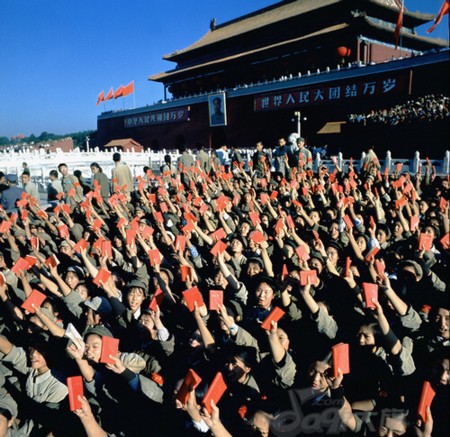As I was reviewing these pieces of history, I could have hit myself for overlooking China's original--and most poignant--form of propaganda: Mao Zedong's Little Red Book. After Chairman Mao came to power, many of his sayings were recorded and published as a small red book. It became unwritten law to carry at all times for continual indoctrination into Communist ideology. It was produced in mass quantities, and as a result, was the most printed book written in the twentieth century.
Accompanying the shift into digital age, I began thinking of the resources the Chinese government could exploit to publish its propaganda. Without the complicated resources of paper, ink, binding, labor, etc., needed to mass produce billions of Little Red Books, what can China accomplish (is accomplishing?) with the seemingly unlimited resources of new technology?

I don't know about you, but something I've been having a hard time with on this paper for ENGL 295 is that I don't know how to incorporate literature into the research I've been doing on new media. But let me ask you this... why didn't Orwell write 1984 based on a print paradigm? Do you think that we, as people, automatically assume that a full totalitarian government must have some kind of wider power than something like print? Does this mean, then, that while Mao's little red book was incredibly influential, China's leaders won't be satisfied until new media becomes completely controlling? Is the complexity of binding, etc. associated with print the only pitfall, or do you think new media simply has more inherent power?
ReplyDeleteThis is a really fascinating point. The Little Red Book really exemplified what a totalitarian government was in the 20th century. You're comparing this to 1984, right? I think that now that print is all but obsolete, governments aren't able to control their people by feeding them propaganda. All they can do is withhold information. So that's what China is doing. The "seemingly unlimited resources of new technology" are being censored a lot, and I'm sure they're replacing them with propaganda as much as they can. That's why Google isn't allowed to operate in China, right? I've never read 1984, but this seems to tie into the idea of Big Brother. I feel like maybe propaganda is out (sort of) and censorship is in? Just a thought.
ReplyDeleteDigital propoganda? I guess they could have a default home page for internet servers - kind of like what we have when we log on to the wireless internet on campus and we get the disclaimer that we have to agree to before we get online access. That's what I would do if I were an evil dictator. Something that says "I agree to be a good citizen lest the law shall smite me" and then click okay. Maybe they're more subtle though with pro government advertizements in the margins of the webpages. My sister's friend going to school in California goes to China at least every couple of years. I could ask her if you'd like, but maybe tourists are exempt at the resorts. Then again maybe not. It'd be interesting to find out.
ReplyDelete